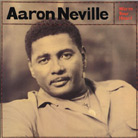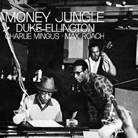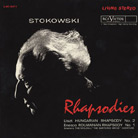![[SoundStage!]](../sslogo3.gif) The Vinyl Word The Vinyl WordBack Issue Article |
March 2006 Found on Vinyl: Aaron Neville, Duke Ellington, and Leopold Stokowski Back when my living quarters had no space for my stereo rig, the SOTA and Maggies in mothballs, there was a lot of the music coming out on vinyl that was of high audiophile quality but questionable musical merit. Yes, there were exceptions, but you know what I mean. We all have at least one such album in our collections -- beautifully packaged, painstakingly mastered, and blah music. They are records you listen to once, go "uh huh," and never play again. Classic Records produces reissues I want to hear, and more than just once. Happily they’re all over the map: jazz, rock, folk, classical -- good music from major artists that will move you emotionally, intellectually, or both. And what a po-po platter we have here: Big Easy listening, raw jazz, and zesty classical. These recordings have a few things in common. Going from master tape to lacquer, the music on each passed through Bernie Grundman’s all-tube cutting system before arriving onto Classic Records’ proprietary 200-gram Quiex vinyl. One thing hasn’t changed for me: the anticipation that comes when opening a pristine new record and lowering the tonearm onto side one. Let’s listen to some music.
Warm Your Heart represents a strong collaboration among Neville, Linda Ronstadt and engineer George Massenburg. The album is a blend of blues, gospel, soul and pop, and it is very well put together. Its big studio sound is aided by arrangements from Ronstadt and performances from Ry Cooder, Dr. John, Carlos Vega, and David Lindley. Neville and Linda Ronstadt join in duet on "Close Your Eyes," which features a big, gooey sax solo from Plas Johnson, and he pairs with Rita Coolidge on the bouncy Jimmy Buffet tune "La Vie Dansante." Despite his stated affection for "Ave Maria," he seems a bit out of his element singing in Latin, and the production values here are not as strong as those for the rest of the album. The album also includes lighter songs with more of a pop orientation, such as "Everybody Plays the Fool," "I Bid You Goodnight," and "Somewhere Somebody." This particular Classic Records reissue might well be the spokes-model for what is possible with the vinyl medium. Instruments and voices emerge from a velvety black background, and my copy was perfectly flat with no hint of pops, clicks or compression. And after multiple playings, its surfaces sound as quiet as when I first cracked the cellophane. Please make more like this one.
Strictly in the left channel and slightly behind the piano is drummer Max Roach and far to the right channel plays Charlie Mingus. If you listen around the occasional distortion, you’ll find cuts on this album that lay bare the dexterous delicacy and lightness of Ellington’s ivory weavings, and cuts where he is charismatically potent and fierce. Consider the aptly titled "Money Jungle," an Ellington original. While it took me several tries to get my head around this music, even a sonata-formed jazz square such as myself came to recognize Ellington’s virtuosity at work. Here is Wall Street life and death -- the money jungle, the music raw and apprehensive -- yet beneath the discord there is pulse and drive. It’s the music of an avant-garde bopper. Ellington lets Roach and Mingus go out, reels them back in, and then lets them go again. When Mingus stops fighting Duke, the two connect on another plane, though at the end they scrap over who will get the last word, and the winner is Roach! A gentle rain, a mystical musing of sophisticated harmonies, the second cut is the antipode to "Money Jungle’s" urban angst. "Le Fleurs Africaines" ("African Flowers") is another Ellington original, and it may be the sleeper on this album. Duke’s timing is so refined and his delicate touch on the keys itself takes on a lyrical quality. Here, Mingus’s bass floats with agile punctuations, while Roach’s drumming is restrained, almost contemplative. These pieces are representative of the diverse talent on this album. Thesis, antithesis, and synthesis -- each musician takes on each role, with the result a tension of energy held (sometimes barely) in balance by Ellington. At points, the trio is at odds with one another and there are moments when they riff together, as if a single man were playing. While his creativity and musicianship cross decades, Ellington’s young ideas challenge the pugnacious Mingus and the cerebral Roach while allowing each his distinctive voice.
Some original copies of Rhapsodies came with a sticker on their cover that read "Voluptuous new interpretations by that Merlin of orchestral witchery," no doubt alluding to Stokowski’s appearance in Disney’s Fantasia. The magic of Stokowski’s sound partly derives from techniques he pioneered with the Philadelphia Orchestra and subsequently brought to each orchestra he conducted. Most notable is the lush tone he achieved by encouraging free bowing among his strings, where musicians within a section are no longer required to sync their up and down bowing gestures according to a concertmaster’s dictate. One need listen no further than side one to hear this effect. In Smetana’s "The Moldau," the string sound Stokowski achieves -- and on each of the Rhapsodies compositions -- is seamless, satiny and sumptuous. "The Moldau" is the second symphonic poem in Smetana’s six-part work Má Vlast (My Fatherland), his orchestral shrine to the legends, history and scenery of Bohemia. Written after Smetana became deaf, it is a program work depicting Vltava, the river Moldau. We listen as the river is birthed with burbling flutes from a spring in the mountains, flows through a forest where we hear the horns of the hunt, then past a lively peasant wedding. Angelic, ethereal strings carry us through a moonlit dance of water nymphs, then the river crashes violently over rapids, meanders onto an open plain, and on through the city of Prague, concluding as it fades into the distance. Compared to a more traditional rendition such as Kubelik’s, Stokowski’s interpretation is more lively and vivid with rhythmic texture. Side one concludes with the Overture from Smetana’s most enduring comic opera "The Bartered Bride." Check out the bowed bass lines in the opening bars -- they are huge -- and listen to the superb brass staccato about three-quarters in. It was the music of Franz Liszt that influenced Smetana’s career, and Liszt is often credited as an originator of both the concept of musical nationalism and the symphonic poem (or "tone poem," as Strauss prefers). Liszt’s music incorporates much from the Roma (gypsy) bands of his day, where tempo change is constant, impetuous, and syncopated with high feeling. Ever the showman, Stokowski conducts the zesty Hungarian Rhapsody No. 2 in C-Sharp Minor with flare and pushes his orchestra to respond in kind. Between woodwind cadenzas emerging from a black background and punchy trombones and percussion, the music dances in marvelous dynamic contrasts. As fiery as it is, the Liszt is but a warm-up for Enescu’s Roumanian Rhapsody No. 1 in A Op.11. Woodwinds enter light and lively, followed by a waltz of lush violins backed by descending scales. The music turns gymnastic as tempos constantly shift. The Quiex vinyl really comes through, as the dynamic shifts are massive yet clear and uncompressed. Just when you think the pace is totally frantic, BAM!, Stokowski kicks it up a notch and the orchestra moves into high gear. Wow! This is music for tumblers, jugglers, sword dancers and plate spinners, and it will give both your stereo system and your ears a real workout. Each of these records would be a worthy addition to collections of their respective genres. Warm Your Heart is sweet, easy listening and a fine display of Aaron Neville’s rich vocal talents. While its sonics are iffy, Money Jungle is a must-have as an example of Duke’s ever-young imagination and the versatility of Roach and Mingus. And, even if you are not into "long hair music," Rhapsodies is an orchestral powerhouse -- a great example of complex acoustical music. Thank you, Classic Records, and keep ‘em coming. ...Tim Aucremann |
|
![[SoundStage!]](../sslogo3.gif) All Contents All ContentsCopyright © 2006 SoundStage! All Rights Reserved |
 Randy Newman may
not have had Aaron Neville in mind when he penned "Louisiana 1927," but after
the devastation wrought by Hurricane Katrina in 2005, it will be Neville’s song. The
song is about the Great Mississippi Flood of 1927 when the river broke through its levees,
left 700,000 people homeless, and killed 246. If you saw Neville perform this during a
televised relief benefit, you heard a mere shadow of the rendition he gives 14 years
earlier on Warm Your Heart [Classic Records / A&M RTH5354]. Here his voice is
full, rich, and clear, and he does not overplay his trademark vibrato. It is a song of
heartache for the Deep South, and as a man singing about his homeland, Neville connects to
it with a subtle poignancy that pulls in the listener.
Randy Newman may
not have had Aaron Neville in mind when he penned "Louisiana 1927," but after
the devastation wrought by Hurricane Katrina in 2005, it will be Neville’s song. The
song is about the Great Mississippi Flood of 1927 when the river broke through its levees,
left 700,000 people homeless, and killed 246. If you saw Neville perform this during a
televised relief benefit, you heard a mere shadow of the rendition he gives 14 years
earlier on Warm Your Heart [Classic Records / A&M RTH5354]. Here his voice is
full, rich, and clear, and he does not overplay his trademark vibrato. It is a song of
heartache for the Deep South, and as a man singing about his homeland, Neville connects to
it with a subtle poignancy that pulls in the listener. You need listen no
further than Money Jungle [Classic Records/United Artists Jazz 15017] to grasp the
genius of Duke Ellington, but if you’re into audiophile sound, you’ll probably
want to look elsewhere. Recorded in New York in 1962 and produced by Alan Douglas with
engineering from Bill Schwartau, this album yields incidents of peaky distortion from the
piano microphone, and I doubt any amount of remastering could cure it. Pushed up front and
center, Ellington’s piano on the high notes sometimes sounds like the boxy upright in
my grandmother’s back room -- the one my cousin and I modified with bottle caps on
the hammers.
You need listen no
further than Money Jungle [Classic Records/United Artists Jazz 15017] to grasp the
genius of Duke Ellington, but if you’re into audiophile sound, you’ll probably
want to look elsewhere. Recorded in New York in 1962 and produced by Alan Douglas with
engineering from Bill Schwartau, this album yields incidents of peaky distortion from the
piano microphone, and I doubt any amount of remastering could cure it. Pushed up front and
center, Ellington’s piano on the high notes sometimes sounds like the boxy upright in
my grandmother’s back room -- the one my cousin and I modified with bottle caps on
the hammers. From
Smetana’s Bohemia (today's Czechoslovakia) to Liszt’s Hungary and on to
Enescu’s Romania, Rhapsodies [Classic Records / RCA LSC-2471] is a tour de
force of Eastern European musical nationalism. Conducted with verve and panache by Leopold
Stokowski and performed by the RCA Victor Symphony, this album is a Shaded Dog sonic
blockbuster. Originally engineered by Robert Simpson on a three-track Amperex tape
machine, its music will stretch your system’s micro- and macrodynamic capabilities as
notes burst alive from an ultra-quiet background.
From
Smetana’s Bohemia (today's Czechoslovakia) to Liszt’s Hungary and on to
Enescu’s Romania, Rhapsodies [Classic Records / RCA LSC-2471] is a tour de
force of Eastern European musical nationalism. Conducted with verve and panache by Leopold
Stokowski and performed by the RCA Victor Symphony, this album is a Shaded Dog sonic
blockbuster. Originally engineered by Robert Simpson on a three-track Amperex tape
machine, its music will stretch your system’s micro- and macrodynamic capabilities as
notes burst alive from an ultra-quiet background.